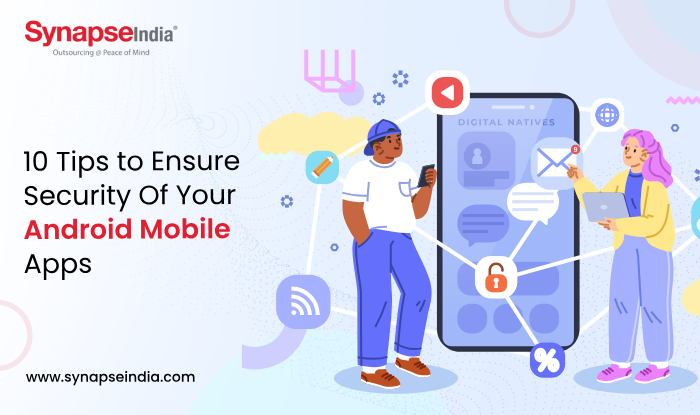 23 Apr 2024
23 Apr 2024“Ensuring the security of Android mobile apps includes implementing data encryption, secure authentication methods, HTTPS for communication, input validation, and secure storage of sensitive information.”

Protecting your iOS device is much easier compared to an Android device. Mobile apps have become an integral part of our daily lives, offering convenience, entertainment, and productivity at our fingertips. As long as Android smartphones continue to rule the world market, it is more important than ever to make sure Android mobile apps are secure. Cybercriminals find mobile apps appealing targets because they store a multitude of sensitive data, ranging from financial to personal information. We'll go over the significance of Android app security in this article, along with recommended procedures for user privacy protection, sensitive data protection, and security risk mitigation. Maintaining trust, integrity, and reliability in the mobile ecosystem requires everyone—developers, business owners, and end users—to grasp the significance of app security.
Update your Android mobile app frequently to ensure it has the most recent security patches and fixes from the Android Security Bulletin. By doing this, you can make sure that your app is always safe against exploits and known vulnerabilities found by the Android Security Team.
To securely confirm user identification, employ strong authentication methods like OpenID Connect, OAuth 2.0, or JSON Web Tokens (JWT). Make use of cryptographic algorithms such as RSA or HMAC to guarantee the confidentiality and integrity of authentication tokens.
The mobile app and backend servers can encrypt data by using Transport Layer Security (TLS). Set up TLS with robust key exchange protocols and cipher suites to fend off MitM and eavesdropping attacks.
Use Android's security APIs, such as Android Keystore for key management and SQLCipher for encrypted database storage, to implement safe data storage procedures. Protect sensitive user data that is locally stored on the device by implementing data encryption at rest using the AES or RSA encryption algorithms.
Use programs like ProGuard or DexGuard to use code obfuscation techniques to obscure the app's bytecode and prevent reverse engineering. To hide the app's source code, use technologies like class encryption, method renaming, and string encryption.
Use libraries such as OWASP Java Encoder to provide input validation techniques that sanitize user input and stop typical security flaws like injection attacks (e.g., SQL injection, XSS). Before processing, validate user-controlled inputs against preset patterns and sanitize them.
Make sure your app uses HTTPS to establish secure connections via secure channels with backend servers and third-party APIs. To authenticate API requests and grant access to protected resources, use secure API authentication methods like JWT tokens, OAuth tokens, or API keys.
Respect Android's permission paradigm and ask users for runtime permissions so you may access private device data like the camera, microphone, contacts, and location. Just ask for permissions that are necessary for the app to work, and let users know why each permission is needed.
When displaying web content in your app using WebView components, use caution. Refrain from loading untrusted or unvalidated webpages in WebView to reduce the possibility of clickjacking and cross-site scripting (XSS) attacks. Set WebView's configuration options to prevent JavaScript from running and limit access to trustworthy domains.
Use penetration testing methods, dynamic analysis tools, and static analysis tools to thoroughly test the security of your Android mobile app. Regular security reviews are necessary to find vulnerabilities and fix them before bad actors may take advantage of them. Hire ethical hackers or specialists in security to carry out in-depth security evaluations and confirm that your app's security measures are working.
In the present, the digital environment linked with cyber-attacks is always becoming more sophisticated, so it is crucial to ensure the security of Android mobile applications. Developers may protect user data and privacy and greatly improve the security position of their applications keeping the top suggestions listed above in practice. Every precaution, from safe coding procedures and encryption methods to thorough testing and continuous observation, is essential to reducing risks and averting possible security breaches. Developers may create durable and dependable Android apps that inspire confidence in users by taking a proactive approach to security and maintaining up-to-date on emerging risks and best practices. In the end, putting security first not only safeguards users and their private data but also maintains the app's integrity and reputation.


